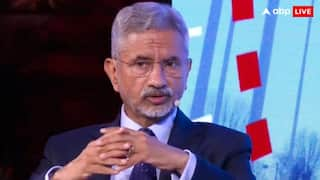Umar Khalid To Get Bail? High Court Seeks Delhi Police's Response, Lists Matter For Next Month
Umar Khalid's wait for bail grows longer as the matter is now listed for hearing on August 29.

The Delhi High Court on Wednesday issued notice on the bail petition filed by former JNU student activist Umar Khalid in connection with the Delhi riots larger conspiracy case. Khalid's wait for bail grows longer as the matter is now listed for hearing on August 29.
A bench comprising Justice Suresh Kumar Kait and Justice Girish Kathpalia sought response of the Delhi Police.
The high court also listed bail pleas filed by co-accused persons including Sharjeel Imam on the same date. The other accused in the case are Meeran Haider, Khalid Saifi, Gulfisha Fatima, Mohd Saleem Khan, Shifa Ur Rehman, Shadab Ahmed and Athar Khan.
The High Court will also hear Delhi Police's petition challenging bail granted to co accused Ishrat Jahan.
On Monday, the Delhi High Court judge Justice Amit Sharma recused from hearing the bail petition moved by Umar Khalid, after which the matter was listed before the current bench.
Khalid moved a fresh bail plea after he withdrew his plea seeking bail from the Supreme Court. Khalid was arrested in September 2020 in UAPA case connected to Delhi Riots of February 2020.
Earlier, a Delhi Court rejected former JNU scholar and activist Umar Khalid's regular bail plea for second time in connection with the Delhi riots larger conspiracy case registered under the Unlawful Activities (Prevention) Act (UAPA).
Additional Sessions Judge Sameer Bajpai of Karkardooma Courts dismissed his bail petition.
The fresh bail plea seeking regular bail was moved by Khalid after he withdrew his petition from the Supreme Court on February 14.
Khalid had moved the top court against the Delhi High Court order denying him bail in October 2022.
Former JNU student leader withdrew his bail application from the Supreme Court due to "changed circumstances". A bench of Justices Bela M Trivedi and Pankaj Muthal allowed his withdrawal petition.
Senior Advocate Kapil Sibal appearing for Khalid told the top court that the application is being withdrawn in view of "change in circumstances" and to seek bail afresh before the trial court. In May, the trial court rejected his fresh bail plea, against which he moved the Delhi High Court. This was the second time his bail plea was rejected by trial court.
Earlier, in March 2022, a Delhi Sessions Court denied bail to Umar Khalid after hearing his case for nearly 8 months. Additional Sessions Judge Amitabh Rawat said a preliminary assessment of the case showed a premeditated conspiracy surrounding the 2020 Delhi Riots that Khalid was involved in.
In April 2022, Khalid appealed against the Session court’s order before the Delhi High Court.
On October 18 2022, a Delhi High Court bench comprising Justices Siddharth Mridul and Rajnesh Bhatnagar rejected Khalid’s plea for bail. The bench observed that the prosecution’s case and the chargesheet made out a prima facie case against Khalid. Saying that Khalid was in constant touch with other co-accused and Khalid's act prima facie qualified as “terrorist act” under the UAPA, the high court denied him bail.
Then Khalid approached the Supreme Court in April 2023, against the Delhi High Court order denying him bail.
In May 2023, a divisional bench comprising Justices AS Bopanna and Hima Kohli heard Khalid's petition and issued a notice to the Delhi government seeking a response within six weeks.
Post this, Khalid's hearing was adjourned 13 times in the Supreme Court and also saw one recusal from a judge in the top court, before it was withdrawn due to changed circumstances.
Khalid has been charged under the IPC, 1967 Arms Act, and Unlawful Activities (Prevention) Act (UAPA). He has also been charged for rioting (Sec. 147 IPC), rioting with a deadly weapon (Sec. 148 IPC), murder (Sec. 302 IPC), attempted murder (Sec. 307 IPC), sedition (Sec. 124A IPC). He has also been accused of promoting enmity between different groups on grounds of religion, race, place of birth, residence, language, etc., and doing acts prejudicial to maintenance of harmony (Sec. 153A IPC).





































